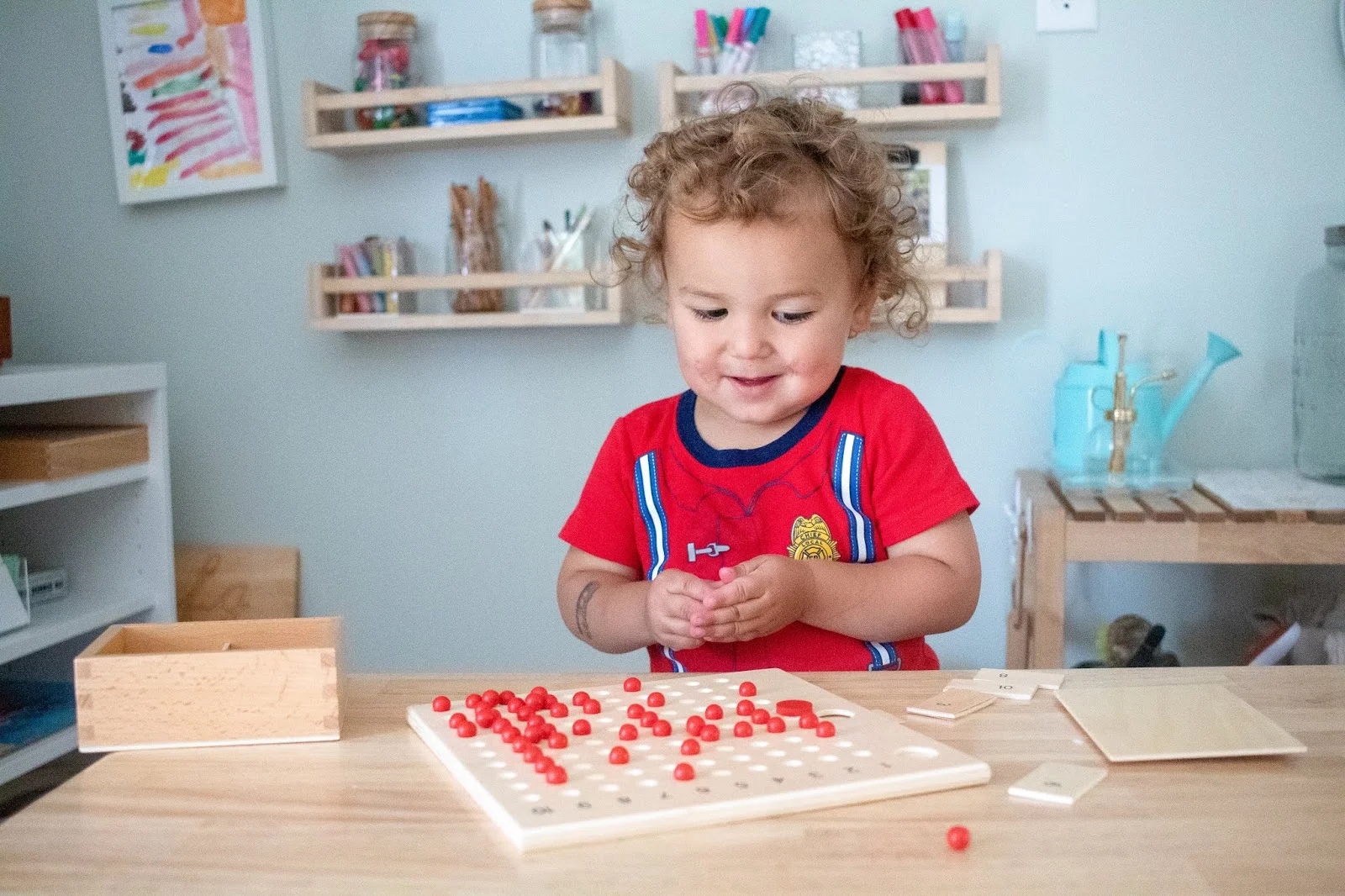Yesterday, I got sucked into some cleaning in my living room. It had been a difficult day - first week of new routines for summer break always is - and I was sort of checked out of all my parenting duties. I heard chatter of the children in the back yard and assumed Gus was with the big kids. But, when I went into the kitchen to start dinner, I stumbled upon a very quiet, concentrated Gus working with Henry's multiplication bead board. Obviously, he's not doing multiplication work, but to him his work was very very real.
This post contains affiliate links at no cost to you.
When I walked in each of the little balls was in a spot, he accidentally knocked the multiplication board at one point so some came flying out. But, he kept on working, hardly even noticing that I had come in and started taking a few pictures. It was so interesting to me because it was such a striking example of the unconscious absorbent mind.
See, Gus has never been shown how to do this work. But, he has seen Henry doing it. He put the numbers in the side and all the little balls in their spots. He knew they were different from balls for pouring/throwing/dumping. He understood they were moved one at a time. But why? What is this unconscious absorbent mind?
Maria Montessori coined this phrase to describe the brains of babies and toddlers from birth until around 3 years old. She observed that these children are able to soak up everything in their environment simply by being in the environment. Language, is the biggest example of this. You don't - for most neurotypical children - have to teach a child their native language. They simply absorb it by being exposed to the language from birth. Same with walking, and playing. In the words of Maria Montessori, "the only thing the absorbent mind needs is the life of the individual; give him life and an environment and he will absorb all that is in it." {From 1946 London Lectures}
Dr. Montessori goes on to describe the absorbent mind like a camera, clicking away impressions of the environment without tiring or stopping. Perfect little snapshots of the world around them, taking in everything they do and see. This is in contrast to an older human's brain which she describes as being like a painter - also able to take impressions from the environment but not as "perfectly" and with greater effort.
So, practically, what does this mean for parents in 2019?
- We need to be aware of this super power in our babies and toddlers - understanding that they are learning and absorbing ALL THE TIME. They never stop learning what they need from the environment. We can feel pressured to provide all the things and never let a "learning opportunity" pass. But in reality, our young babies/toddlers are always working, without fatigue. We need to give them an environment, the space, and the time to allow them to do this work!
- We need to MODEL. They are constantly absorbing everything we say and do, even when we don't want them to. Our interactions with others, with them, with our environment, and with ourselves are being absorbed. Make sure it's what you want your child to be seeing.
- We need to give our children real experiences in the world. We need to expose them to the beauty and the wonder around them. Take them to real adult places, allow them to witness real adult conversations, allow them to experience not just a "child's space" created for them, but the real actual world.
- We need to observe. If I had just shooed Gus away from Henry's work, this opportunity to see his learning in action would have been missed. Observation is the key to understanding what your child knows and has absorbed. It gives us clues into what our child is interested in and where we might need to model more.
When Gus was done with the multiplication board (when all the beads had been placed on the board) he slowly cleaned up. I didn't say anything. He picked up every single bead, and returned to where he had found the work on the shelf. It has been internalized as part of the process - something he has seen me, his sister, and brother do countless times. It was an amazing moment to watch, and a powerful reminder about how truly amazing small children are.
And, all I can think about is this quote from Maria, "we must conclude from all this that the child possesses, in his unconscious, a power which is different from any we possess...This conclusion is different from the general one, which is that the child does not possess a mind because his mind is so different from our own. On the contrary, the child's powers are superior to ours. He is endowed with possibilities we no longer possess." {1946 London Lectures}
Have you noticed this amazing power in your baby or toddler?
---






